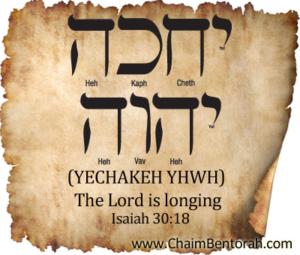HEBREW WORD STUDY – THE LORD IS LONGING – YECHAKEH YHWH יחכה יהוה Yod Cheth Kap Hei Yod Hei Vav Hei
Isaiah 30:18: “Yet the LORD longs to be gracious to you; therefore he will rise up to show you compassion. For the LORD is a God of justice. Blessed are all who wait for him!” NIV
Isaiah 30:18: “Therefore the LORD waits to be gracious to you, and therefore he exalts himself to show mercy to you. For the LORD is a God of justice; blessed are all those who wait for him.” ESV
Isaiah 30:18: “And therefore will the LORD wait, that he may be gracious unto you, and therefore will he be exalted, that he may have mercy upon you: for the LORD is a God of judgment: blessed are all they that wait for him.” KJV
 Which do you like better? 1. The Lord longing for you, 2. waiting for you or 3. will wait for you. The first one coming from the NIV suggests a lover waiting for his beloved to arrive. The second from the ESV suggest someone patiently waiting for a guest to arrive and the third from the KJV suggest that the person is not yet waiting for a guest to arrive but is not quite ready for that guest.
Which do you like better? 1. The Lord longing for you, 2. waiting for you or 3. will wait for you. The first one coming from the NIV suggests a lover waiting for his beloved to arrive. The second from the ESV suggest someone patiently waiting for a guest to arrive and the third from the KJV suggest that the person is not yet waiting for a guest to arrive but is not quite ready for that guest.
These renderings are from the top three best-selling translations and all say something a little different. Obviously, most people would choose the NIV and who would not? It is one thing to have God waiting for you and quite another thing to have God longing for you.
The keyword in question is the word yechakeh from the root word chakah which means to wait. But so does the word qavah in Isaiah 40:31 which means to wait. But that wait means to bind yourself with God. There is yachal which is a waiting with expectation and you have matach which is spreading out sort of like extending your waiting period. Each Hebrew word for wait has a different type of nuance. This word in Isaiah 30:18 has the idea of waiting for that right moment. It is like a young lover with an engagement ring waiting for just that right moment to pop the question. He wants everything to be just perfect, the right atmosphere, the right lighting, the right mood, and then he presents the ring. It is a moment to be remembered for a lifetime.
Would you like Chaim Bentorah as your personal Hebrew teacher?
|
|
The word yechakeh is in a Piel imperfect form so it could be rendered as a present tense, He waits, He is anxiously anticipating, longing to look forward to the event. It could also be in a future tense, He will wait to look for that right moment. Both express the idea of anticipation and longing for a wonderful and exciting event. All three translations are correct, they can express the idea of longing for a rewarding event. For me, the NIV using the word longing expresses it best. Perhaps one of the other translations expresses it best for you. You choose because grammatically they are all correct renderings.
What is God longing for? He is longing to be gracious to us. The word gracious comes from the root word chanan and is in a Qal infinitive construct. An infinitive construct gives you extra information about a verb. In this case, it is giving you extra information about this word wait or longing. It is telling you that this longing is a longing to be gracious. Chanan means to fill a request, grant a favor, to equip with intellectual abilities, to give knowledge, and to bless someone. God is longing to do all these things, but He is also waiting for the right time to do them, the moment when it will be most useful and effective.
We pray and pray and wonder why God has not answered our prayers. Maybe, God is just waiting for that right moment, that yechakeh to answer that prayer. Note the word is in a Piel form, it is intensive. He not only longs to answer your prayer but to answer it in a way that is far beyond what we could think or imagine.
Hi there! Thank you for reading this Daily Word Study. Can I ask a favor? Share this Daily Word Study with your friends on Facebook and Twitter by clicking one of the icons below.
Thanks & Blessings, it means a lot to me!







Thank you Dear Teacher for all that you teach me .
I wish that the translation would have said that the Lord longingly waits . It helps me to read the whole chapter to fully understand the question .The people have turned away from God and He is hoping for their (our) return to His loving embrace . The story of the “Prodigal Son” fits this very well .
Much of what is in the “New Testament” is tied into the ” Old Testament ” .I like to think of what people call the New Testament as the Renewal Testament since it tells what has been true since the beginning of time .What Jesus said in the “New Testament” He also said through Prophets in the Old Testament . Isaiah is the Prophet that Jesus spoke through the most I believe .
Thank you
Another great translation
Shalom, an Maranatha